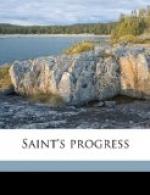“I’m going to see a hospital to-day, Nollie,” he said; “if you like, I’ll make enquiries. I’m afraid it’ll mean you have to begin by washing up.”
“I know; anything, so long as I do begin.”
“Very well; I’ll see about it.” And he went back to his egg.
Noel’s voice roused him. “Do you feel the war much, Daddy? Does it hurt you here?” She had put her hand on her heart. “Perhaps it doesn’t, because you live half in the next world, don’t you?”
The words: “God forbid,” sprang to Pierson’s lips; he did not speak them, but put his egg-spoon down, hurt and bewildered. What did the child mean? Not feel the war! He smiled.
“I hope I’m able to help people sometimes, Nollie,” and was conscious that he had answered his own thoughts, not her words. He finished his breakfast quickly, and very soon went out. He crossed the Square, and passed East, down two crowded streets to his church. In the traffic of those streets, all slipshod and confused, his black-clothed figure and grave face, with its Vandyk beard, had a curious remote appearance, like a moving remnant of a past civilisation. He went in by the side door. Only five days he had been away, but they had been so full of emotion that the empty familiar building seemed almost strange to him. He had come there unconsciously, groping for anchorage and guidance in this sudden change of relationship between him and his daughters. He stood by the pale brazen eagle, staring into the chancel. The choir were wanting new hymn-books—he must not forget to order them! His eyes sought the stained-glass window he had put in to the memory of his wife. The sun, too high to slant, was burnishing its base, till it glowed of a deep sherry colour. “In the next world!” What strange words of Noel’s! His eyes caught the glimmer of the organ-pipes; and, mounting to the loft, he began to play soft chords wandering into each other. He finished, and stood gazing down. This space within high walls, under high vaulted roof, where light was toned to a perpetual twilight, broken here and there by a little glow of colour from glass and flowers, metal, and dark wood, was his home, his charge, his refuge. Nothing moved down there, and yet—was not emptiness mysteriously living, the closed-in air imprinted in strange sort, as though the drone of music and voices in prayer and praise clung there still? Had not sanctity a presence? Outside, a barrel-organ drove its tune along; a wagon staggered on the paved street, and the driver shouted to his horses; some distant guns boomed out in practice, and the rolling of wheels on wheels formed a net of sound. But those invading noises were transmuted to a mere murmuring in here; only the silence and the twilight were real to Pierson, standing there, a little black figure in a great empty space.
When he left the church, it was still rather early to go to Leila’s hospital; and, having ordered the new hymn-books, he called in at the house of a parishioner whose son had been killed in France. He found her in her kitchen; an oldish woman who lived by charing. She wiped a seat for the Vicar.




